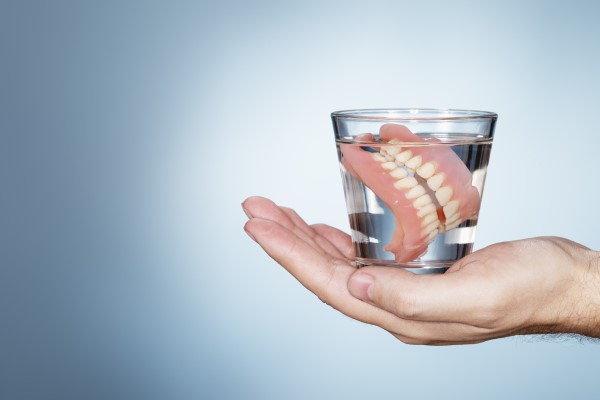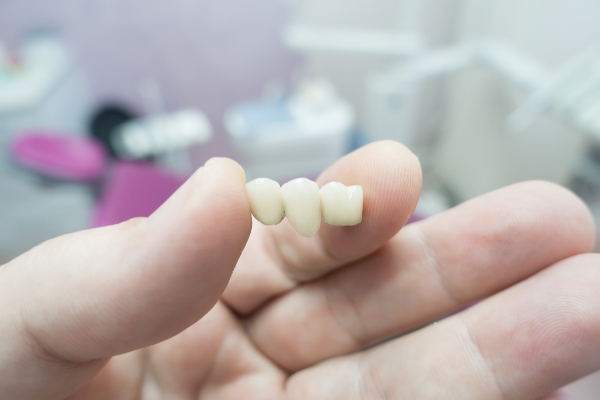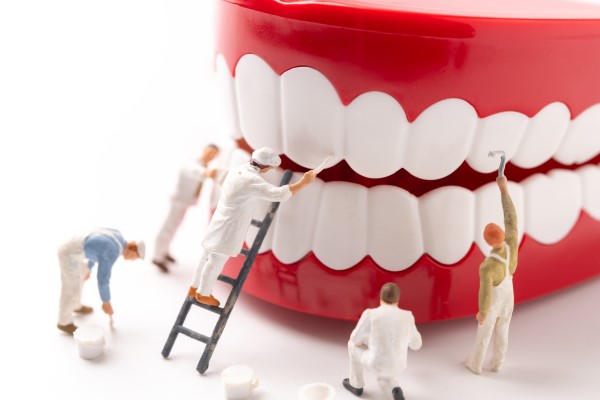Dentures to Replace Missing Teeth and Gums

A set of dentures is a tooth replacement solution for people who have lost one or more teeth. It enhances the look of teeth while also restoring their function. Read on to learn more about how dentures are used for restoring lost teeth and gums.
Getting dentures
The number of missing teeth on the jaw determines the sort of dentures that the dentist will recommend for the patient. If only a few teeth are missing, the dentist may offer partial dentures to fill in the gaps. A full denture will be required if most or all of the teeth are missing.
Partial dentures
Removable partial dentures and fixed partial dentures are the two types of partial dentures. Removable partial dentures are made out of prosthetic teeth held in place by a gum-colored plastic foundation. A metal structure that supports the denture is usually linked to the base. The metal framework that keeps the detachable partial dentures in place is prone to breaking, so they will need to be fixed or replaced regularly.
Fixed partial dentures are not detachable once placed in the mouth. They are supported by dental implants, which act as the foundation for the prosthetic teeth. Dentures held in place by dental implants are more stable and last longer, enabling patients to use them for more extended periods before needing replacement.
Full dentures
Full dentures have two forms: traditional full dentures and immediate complete dentures. Traditional dentures are manufactured when all the teeth in the mouth have been lost or removed, and the gum tissue healing is complete. These dentures are not installed in the mouth until eight to 12 weeks after the teeth extraction.
Immediate dentures are produced before the remaining teeth are removed and may be installed right away. Many individuals choose these dentures in order to continue to have teeth throughout the healing process. However, there is the drawback of requiring more modifications for a correct fitting. Therefore, most dental professionals use them as a temporary option before the traditional full dentures set is ready.
The process of making dentures
The bone and gum tissue will begin to heal and cover the tooth socket after a tooth is removed or lost. It takes a few months for the gums and bone to stabilize. At this point, patients can visit the dentist for a traditional complete denture, ideally between 8 and 12 weeks after their teeth have been pulled or lost from the mouth.
The first step is to take imprints or molds of the oral tissues, which will hold the denture. These imprints will be used to create models of the patient's mouth at a dental laboratory. Each phase of the denture-making process must be done in the patient's mouth. The dentist and lab technician will make sure the dentures fit properly, create a good bite, and have a pleasing look and feel in the mouth.
Until the denture production is done, the patient will need to visit the dentist once a week for roughly four to five weeks. After the denture is supplied, the patient will need to return to the dentist many times throughout the first month for minor modifications.
What to expect
Patients who have never gotten dentures before may feel a strange sensation in their mouth during the first few weeks. The oral muscles and tongue need to get used to supporting the dentures so the patient can feel at ease when wearing them or taking them off. When patients start wearing dentures, they may also experience discomfort or pain. However, this will lessen as the patient gets used to them.
The dentist will let patients know how long to wear their dentures each day. They may have to wear them all day at first to figure out which sections of the denture need to be adjusted. After the final adjustments have been made, the patient will be instructed to remove their dentures before going to bed.
Dentures might be tricky to eat with. Start with soft meals, and gradually introduce more solid ones, chewing them on both sides of the mouth. It is advisable to avoid sticky or chewy meals. The denture will stay in place when the cheeks and tongue are acclimated to it.
Conclusion
Dentures are a cost-effective and efficient solution to restore lost teeth without undergoing intrusive treatment. If you have lost several teeth and want to restore your smile, speak to your dentist about getting dentures.
Request an appointment here: https://brimhalldentalgroup.com or call Brimhall Dental Group at (661) 249-1122 for an appointment in our Bakersfield office.
Check out what others are saying about our dental services on Yelp: Dentures and Partial Dentures in Bakersfield, CA.
Recent Posts
Removable artificial teeth are called dentures. They replace permanent teeth lost or extracted due to damage or extensive decay. False teeth are a traditional dental restoration method that has been around for centuries and is still effective today. However, there are things you need to know about them before you start wearing them.Your dentist can…
Living with dentures can make life easier. They are aesthetically pleasing, improve your chewing efficiency and can help you speak like normal once more. A well-fitting denture may make your life convenient. However, there are a few things to remember about living with the replacement teeth.For starters, you should try to avoid sleeping in them…
Complete or partial dentures are just some of the options available for replacing lost teeth. Full or partial tooth loss, if not restored, affects a person’s image and puts them at the risk of nutritional disorders and challenges with regular dental functions. Dentures have been used for many decades and are available in different varieties.…
Dentures provide a way for people missing teeth to eat, speak and smile as they used to. In fact, according to the American College of Prosthodontists, 90% of people without teeth have some form of dental prosthetics. However, many health concerns arise when these do not fit correctly in the mouth.There are a few common…


